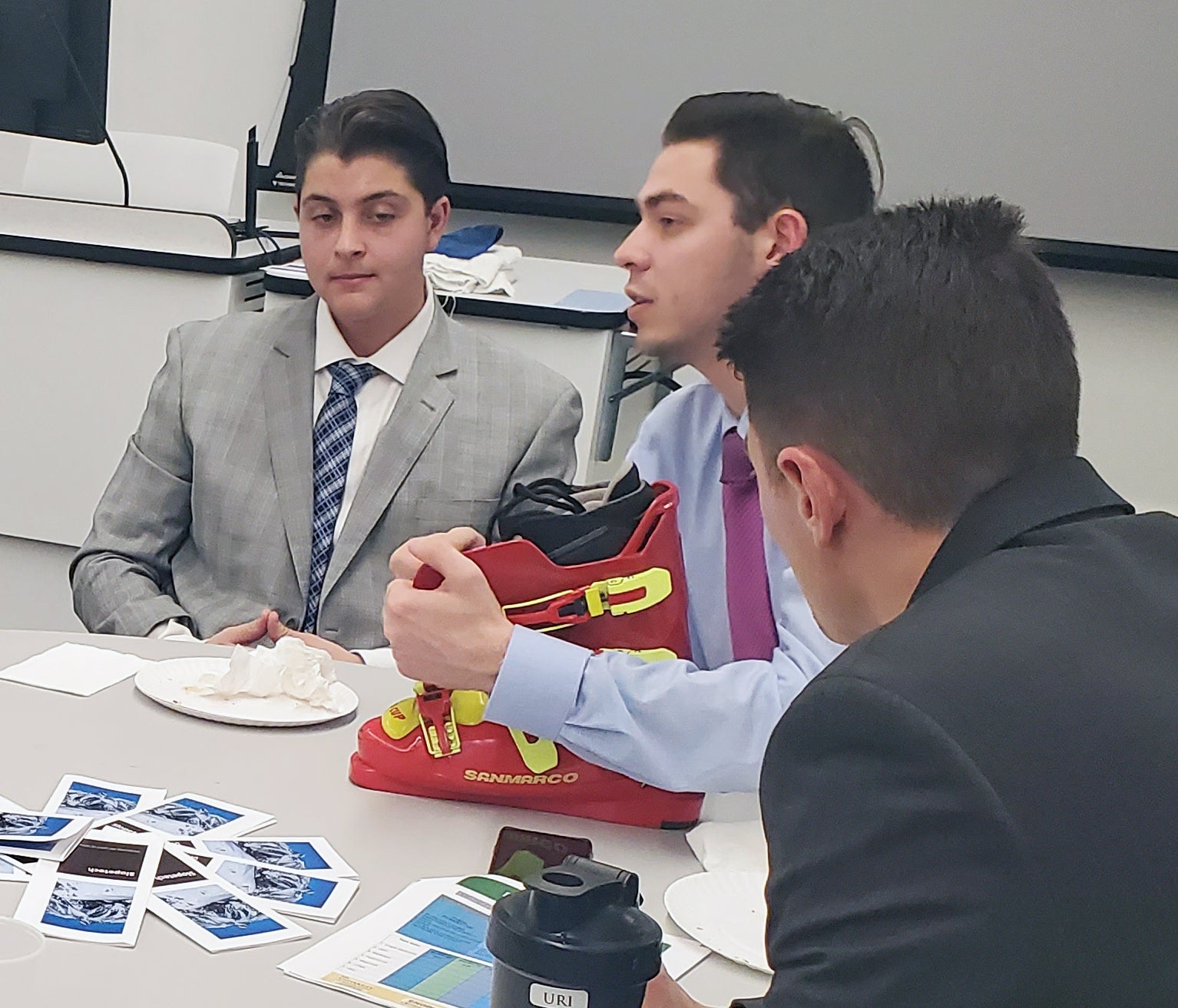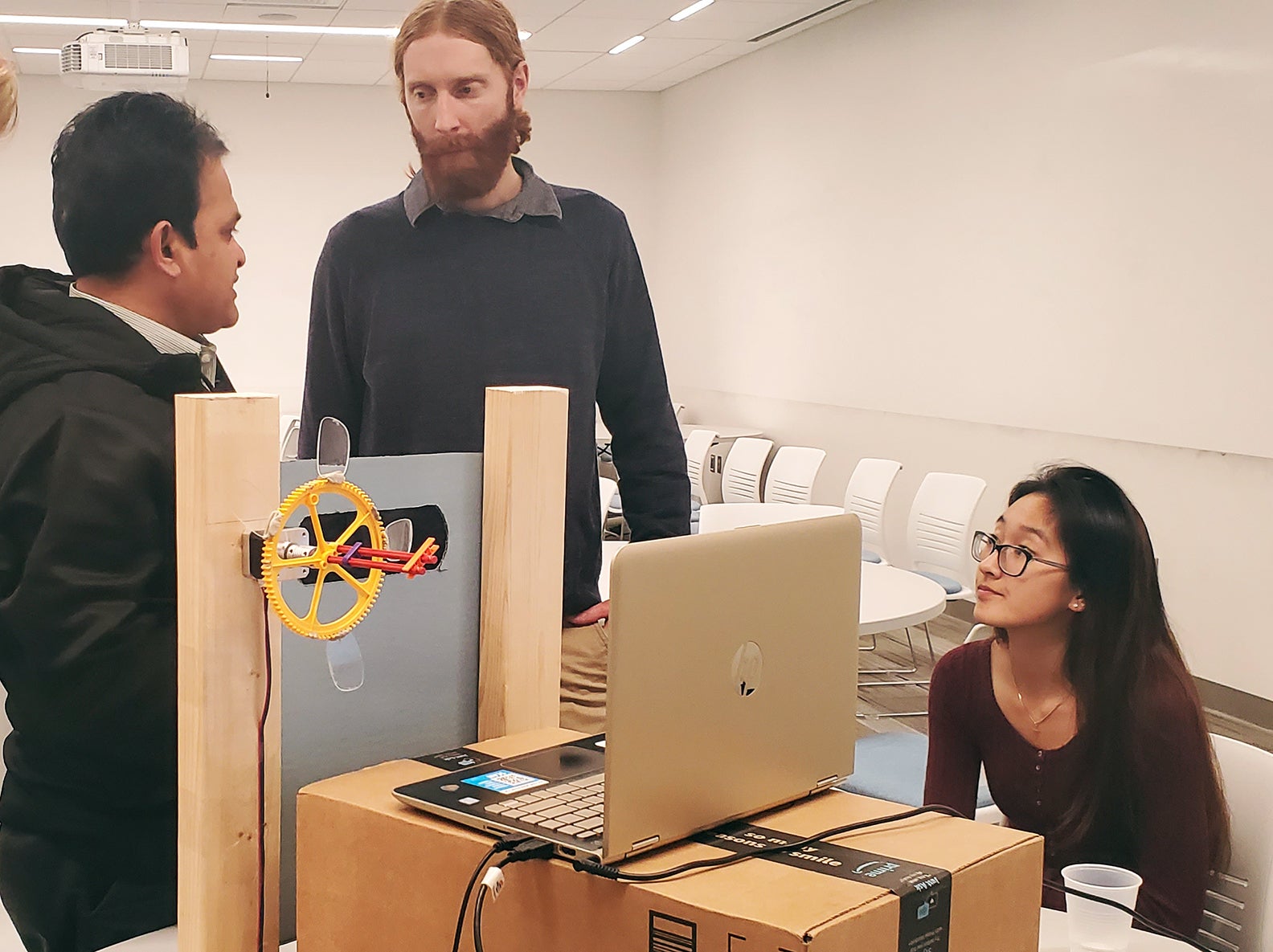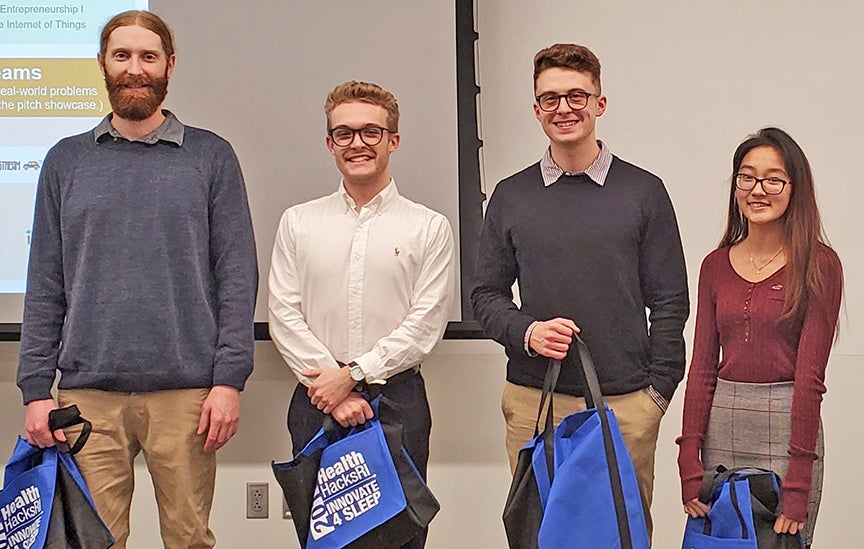KINGSTON, R.I. – December 20, 2019 – There are many steps to becoming an entrepreneur. Over a 14-week span in the fall 2019 semester, 28 University of Rhode Island students, representing eight different majors, learned about each stage of the process.
From exploration to ideation to creation, the students were placed into seven teams to turn an idea into a product prototype that filled a market need. The semester culminated in a demonstration and six-minute pitch of each product to a panel of judges.
“The pitch showcase creates a competitive experience for the student teams to present their products to business and investment experts,” said Associate Professor Kunal Mankodiya, who taught the course. “One of the most important skills entrepreneurs need is knowing how to speak about their company and product effectively in a short amount of time.”

This was the fifth year that students from the course have showcased their products, but only the second when they have pitched them to judges.
“I found the presentations and idea conceptions very well developed,” said Shannon Shallcross, chief executive officer of BetaXAnalytics. “The outcome is certainly a reflection of the hard work of the teams and the quality of the curriculum.”
Shallcross was one of six industry experts to serve as a judge. Kiran Uppuluri, founder and chief executive officer of verteXD, echoed Shallcross’ sentiment.
“I was particularly impressed with the teams’ approach that started with a clear articulation of the customer unmet need and/or pain point,” said Uppuluri. “The solutions and demos were innovative, realistic and human-centered.”
Other judges were Annette Tonti, managing director of RIHub; Patrice Milos, co-founder, president and chief executive officer of Medley Genomics; Thorne Sparkman, managing director of the Slater Tech Fund; and Wasim Malik, managing partner of IASO Ventures.

The judges scored the teams on their knowledge of the problem they would be solving, the need they would be addressing, how well their product would fill that need, their ability to identify their customer base and their competition in the marketplace, and the demonstration of their prototype.
The winning team developed an eye exam kiosk, called iSee, that provides users with a lens prescription that they can take to their local eyewear retailer. It also provides customers with interactive eye-care information to increase eye health awareness. The kiosk has a simple user-interface and can be placed in a mall, drugstore or big box retailer.
“We really learned a lot about turning a small idea into a winning concept and possibly a very marketable product,” said Aidan Votaw, a fifth-year senior studying mechanical engineering and German through URI’s International Engineering Program. “We really liked the hands-on experience that this course offered. It was very rewarding to physically build something and have it work.”
Votaw and his teammates got a late start on their iSee project after realizing a few weeks into the semester that their initial idea of using sensors to locate available parking on campus was already being worked on by another team.
“We were several weeks behind once we had our new idea, so we had to work very hard to develop and solidify the concept for our product,” said Votaw, who is from Warren, Rhode Island. “Considering my teammates and I never previously worked together, we did a great job of collaborating on our concept and dividing the responsibilities equally. We each knew exactly what was expected of us.”
The second-place team created a smart knee brace, which has several flexible sensors to measure the movements of the joint and the diameter of the knee. The sensors communicate changes in the swelling of the knee periodically via Bluetooth to a smartphone or other electronic device through an app, enabling the patient and doctor or physical therapist to access the data.
Six of the seven teams in the competition also participated in the Rhode Island Elevator Pitch Competition, giving them additional real-world experience. Four students from the course took part in the 2019 HealthHacks RI event at URI, a 48-hour hack-a-thon held in October.
“I encourage students to enter external competitions and continue to develop their product and pitch skills,” Mankodiya said. “When the time comes for them to kick off their entrepreneurial journey, I believe they will benefit from having taken this course.”
Here were the three winning teams of the pitch competition/demonstrations.
Place and Product, Name, Major
First Place, iSee,
Noah Burke, Chemical Engineering
Rebecca Pham, Biomedical and Electrical Engineering
Ethan Ribb, Electrical Engineering
Aidan Votaw, Mechanical Engineering and German
Second Place, iJoint,
Jordan Barbosa, Mechanical Engineering
Brendan Driscoll, Biomedical Engineering
Jack Jenckes, Finance and Entrepreneurship
Eydis Embla Ludviksdottir, Electrical Engineering
Third Place, SlopeTech,
Joshua Clift, Electrical Engineering
Leonardo Giarrusso, Communication
Renee Gordon, Biomedical Engineering
Rob Tampellini, Mechanical Engineering

